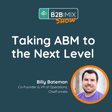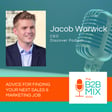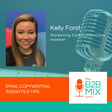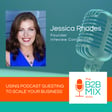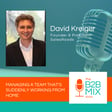
How Do You Find a "Brand New Name"?
Listeners, did you know we're facing a naming drought? It's true!
Thinking up terrific ideas for your next branding project is the fun part. Finding an idea that hasn't been taken yet . . . well, that's the not so fun part. This challenge, among other branding issues, is why we're welcoming Jeremy Miller, founder of Sticky Branding, and author of Brand New Name.
Listen in for Jeremy's tips, to hear his story on how he got started in branding, and how the real genius ideas may be uncovered by your own team.
Want to connect with Jeremy online?
And be sure to check out Jeremy's books:
--
About The B2B Mix Show:
The B2B Mix Show with Alanna Jackson and Stacy Jackson is brought to you by Jackson Marketing. Need help with your B2B online presence? Let’s talk!
Connect with us on social media:
The B2B Mix Show — Twitter, Instagram, LinkedIn, Facebook
